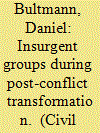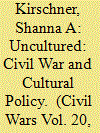| Srl | Item |
| 1 |
ID:
160367


|
|
|
|
|
| Summary/Abstract |
Contemporary international mediation is often multiparty and involves a number of states and multilateral organisations. What are the conditions that account for successful multiparty mediation in conflict resolution? To address this question, I use qualitative comparative analysis (fsQCA) and focus on individual dimensions of mediation, namely internal cohesion of the mediating coalition, the use of reward and coercive power, and the presence of a ‘mutually hurting stalemate’ (MHS). I posit that the presence of a cohesive mediating coalition is a necessary condition for conflict resolution, whereas the provision of security guarantees, the imposition of sanctions and the presence of an MHS play a causal role in conflict resolution only in conjunction with other conditions. I test these conditions using a fuzzy-set approach and data from 20 mediated agreements over separatist conflicts in the post-cold war era. Empirical findings provide support for some of these propositions and challenge relevant theories of international mediation. More specifically, this research shows that a high convergence of interests among mediators is the only necessary – albeit not sufficient condition – for conflict resolution. Second, the analysis highlights the presence of two main sufficient paths for mediation success.
|
|
|
|
|
|
|
|
|
|
|
|
|
|
|
|
| 2 |
ID:
160366


|
|
|
|
|
| Summary/Abstract |
Civil wars cause extreme insecurities, both physical and ontological. Ontological security is the state of identity stability and predictability, generated by social and cultural routines and the continuity of collective identities and the meanings they produce. What is the impact of civil war on dynamics of ontological security and insecurity? And is it possible to prevent the reconstruction of ontological security around exclusionary identities? The paper develops a theoretical framework for the analysis of ontological insecurity during and after civil wars, and examines it in the case of the Liberian civil war (1989–2003). The war saw the mobilisation and victimisation of large parts of the population in various ways, introducing unprecedented instability and unpredictability, and causing widespread ontological insecurity. Ontological insecurity in the wake of the war resulted in extreme mistrust and a lingering sense of victimisation. The Liberia TRC, among other attempts to address the injustices of the past, did not resolve these complexes, but rather led to the reconstruction of ontological security around the ‘victim’ identity in the country, with dire implications for transitional justice in the country.
|
|
|
|
|
|
|
|
|
|
|
|
|
|
|
|
| 3 |
ID:
160363


|
|
|
|
|
| Summary/Abstract |
The article discusses the experiences of a group of military strongmen during the post-conflict transformation of two Cambodian insurgent movements into a society of peace after a decades-long civil war. It explains the reasons why some of these strongmen were able to transfer their high status within the insurgency into senior positions in the incumbent government, while others became impoverished and sometimes even preferred to relapse into further conflict. Even though all of these strongmen shared a very similar life course and fought until the end of the conflict, their post-conflict fates have been very different. Central to the explanation of their behaviour during the transition is their habitus, the set of resources at their disposal and the nature of their vertical and horizontal social networks.
|
|
|
|
|
|
|
|
|
|
|
|
|
|
|
|
| 4 |
ID:
160365


|
|
|
|
|
| Summary/Abstract |
Ethno-national territorial disputes typically involve conflicting homeland claims between states and minority ethnic groups. Where such minority ethnic groups have cross-border ethnic kin who themselves constitute a dominant or influential ethnic group in a neighbouring state, separatist goals may take the form of either irredentism or independence. We conjecture that external sympathy for irredentism and independence may vary significantly, and that this variation may be an important influence in situations where secessionist groups and ethnic kin states have a choice between the two goals. Using a bargaining framework that controls for variation in relative power, status quo conditions and minority-side leadership preferences, we present experimental evidence indicating that external audiences are likely to support more confrontational policies in pursuit of independence than in pursuit of irredentism. Our evidence also indicates that independence attracts greater support largely because outsiders perceive it as a more legitimate goal; and that practical efficacy is not important in stimulating sympathy for either independence or irredentism. These results also support a broader argument in the literature on international norms – that such norms receive support not only because they may justify pre-existing goals or interests, but also because they are perceived as having greater legitimacy per se.
|
|
|
|
|
|
|
|
|
|
|
|
|
|
|
|
| 5 |
ID:
160364


|
|
|
|
|
| Summary/Abstract |
How does cultural policy affect violence? While cultural discrimination is frequently cited as a potential grievance motivating political violence, the relationship remains under-theorised and largely untested. I weave theoretical literatures with interviews and secondary sources on the experience of Kurds in Turkey to understand the socio-economic and psychological pathways through which cultural policies impact intrastate conflict. I then analyse cross-national data on political violence, demonstrating that cultural grievances increase support for violence, raise the chance and severity of conflict and prolong violent conflicts. In short, policy matters: cultural restrictions exacerbate violence through multiple pathways.
|
|
|
|
|
|
|
|
|
|
|
|
|
|
|
|
| 6 |
ID:
160362


|
|
|
|
|
| Summary/Abstract |
What is the relationship between drug violence and political attitudes? In this article, we test the relationship between violence and trust using both individual and municipality data for Mexico from 2006 to 12. Using multilevel analysis, we find no support for the thesis that individual experiences with criminal violence drives trust, nor do we find a relationship between levels of violence at the municipio level and trust. However, we do find that perceived threats to individual security leads to less social and institutional trust, but this is independent of personal experience and whether the individual resides in violent communities.
|
|
|
|
|
|
|
|
|
|
|
|
|
|
|
|